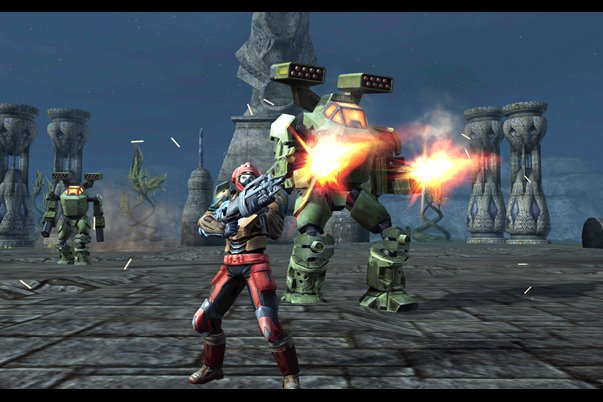Tabula Rasa - hands-on
Filling in the blanks
Positioning is especially important for fighting larger enemies. The Bane’s floating gunships possess front-mounted shields, and the majority of their weapons point forwards too. In a head-on conflict, they’re going to tear you to pieces. However, if you can strike from the rear - perhaps using the terrain to conceal yourself until it passes - you get to bypass its defenses and its weaponry. Starr stresses that the team has tried to work strategic approaches like this into every battle. Abstractly, players that are ten levels below a monster should still be able to deal with it - if they use very careful tactics.
Positioning is especially important for fighting larger enemies. The Bane’s floating gunships possess front-mounted shields, and the majority of their weapons point forwards too. In a head-on conflict, they’re going to tear you to pieces. However, if you can strike from the rear - perhaps using the terrain to conceal yourself until it passes - you get to bypass its defenses and its weaponry. Starr stresses that the team has tried to work strategic approaches like this into every battle. Abstractly, players that are ten levels below a monster should still be able to deal with it - if they use very careful tactics.

Character development departs from the norm as well. Your avatar changes radically as you advance. You start as a recruit, introduced to combat and support skills. At level five, you have a choice between becoming a specialist or a soldier. Later, soldiers get to weigh up the pros and cons of being a heavy hitter commando or the more stealth-centered ranger, and specialists get the sciences of the bio-technician or the more mechanically minded sapper.
These each open up into two more career options (for example, ranger into sniper or spy). The system enables you to actually experience the game before making the all-important decision of what you want to be. It's giving you an educated choice rather than one you might regret. Equally, you're able to "clone" a character, effectively saving your progress and enabling you to try out other career options without having to return to the beginning of the game and retread old ground.
Character development departs from the norm as well. Your avatar changes radically as you advance. You start as a recruit, introduced to combat and support skills. At level five, you have a choice between becoming a specialist or a soldier. Later, soldiers get to weigh up the pros and cons of being a heavy hitter commando or the more stealth-centered ranger, and specialists get the sciences of the bio-technician or the more mechanically minded sapper.
These each open up into two more career options (for example, ranger into sniper or spy). The system enables you to actually experience the game before making the all-important decision of what you want to be. It's giving you an educated choice rather than one you might regret. Equally, you're able to "clone" a character, effectively saving your progress and enabling you to try out other career options without having to return to the beginning of the game and retread old ground.
Sign up to the GamesRadar+ Newsletter
Weekly digests, tales from the communities you love, and more


